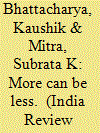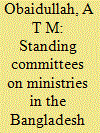| Srl | Item |
| 1 |
ID:
129996


|
|
|
|
|
| Publication |
2014.
|
| Summary/Abstract |
A large number of candidates has become a regular feature of Indian elections. Given the regulatory concerns the problem has evoked, this article reviews the process of candidate entry in select developed countries. The review reveals the presence of diverse approaches, ruling out the necessity for extreme options like debarring fringe candidates-a course suggested by several Indian expert groups. Among various policy options, India had largely relied on electoral deposit. Our results suggest that an increase in deposits had a significant negative impact on candidate entry in India. However, for an effective deterrence, India needs to continue to keep deposits at a very high level compared to the current international benchmark, discriminating political participation of genuinely underprivileged groups. In contrast, the current level of signature requirements, a relatively unused policy tool in India, was found to be too low and could be easily increased further in order to be effective. We argue that given the high variation and lack of stability in candidate structure across regions and over time, a local approach on signature requirements-as in the U.S. -could be an effective deterrent in India. Accordingly, we suggest that the Election Commission of India should not only have the power to determine the deposit before each election; it should also have the power to change the minimum signature requirement across constituencies (subject to some standard checks and balances).
|
|
|
|
|
|
|
|
|
|
|
|
|
|
|
|
| 2 |
ID:
127686


|
|
|
|
|
| Publication |
2011.
|
| Summary/Abstract |
Since parliamentary democracy in Bangladesh was restored in 1991, the reorganisation of parliament has become the centre of attention. Development partners have been keen on organisational and institutional reforms in parliament to make a meaningful shift to the parliamentary system that was put in place abruptly and without adequate preparations. This transformation called for a revision of rules and the modernisation of the parliamentary secretariat, rejuvenating the committee system. This article highlights the major steps taken in the reorganisation of the standing committees of the parliament in Bangladesh, in an attempt to increase the parliament's institutional/oversight capacity on the executive. It traces the weaknesses of the parliamentary standing committees of the early 1990s, findings and recommendations of the major reform measures and the state of affairs in the aftermath of reforms. However, strengthening parliamentary committees and their oversight capacity on the executive needs systemic and institutional changes, which calls for strong political commitment and strategic leadership on the part of senior parliament management and change in the mindset of the executive.
|
|
|
|
|
|
|
|
|
|
|
|
|
|
|
|